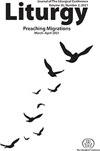Liturgical Renewal 1966–2020—A Mainline Protestant Perspective
IF 0.3
0 RELIGION
引用次数: 0
Abstract
I have been invited to offer a mainline Protestant perspective on liturgical renewal and liturgical scholarship over the past fifty years. It is important to note that this is only one perspective, and that of a now late-middle-aged white male. While I have lived with and experienced the liturgical reforms and changing modes of studying liturgy as a church musician, pastor, and theological educator primarily in the context of The United Methodist Church, my own liturgical formation and scholarship has been shaped ecumenically by the liturgical and sacramental theology of Baptism, Eucharist and Ministry, the publication of which coincided with my entry into seminary at Yale. It was there that I first encountered the historical and pastoral study of liturgy through Jeffrey Rowthorn’s curricular sequence on the roots, reforms, and renewal of liturgy, and the theological study of liturgy through Aidan Kavanagh’s defining work in liturgical theology and explorations in ritual anthropology. Forty years after that initiation into the study of liturgy and liturgical theology, I identify several threads shaping the work of liturgical reform and of liturgical theologians: ecumenical roots, tensions in and challenges to those ecumenical roots, and emerging methodologies. While these threads are loosely tied to Gordon Lathrop’s piece elsewhere in this issue, they are also spun from Thomas Schattauer’s 2007 reflections on the teaching of liturgical studies. There Schattauer rightly describes liturgical studies “as a field of multiple disciplines and perspectives” that make use of a variety of perspectives. He then traces the ways in which the study of Christian and Jewish worship have developed from a primary emphasis on the comparative “historical study of liturgical texts and other textual witness to liturgical practice” to a broader focus on the “material evidence of worshiping communities (architecture, visual art, furnishings, vessels, etc.),” to more anthropological and sociocultural attention to liturgical practices in their cultural contexts and to liturgy “as a ritual and symbolic event” and as a communicative practice. Such study of liturgy, Schattauer argues, is shaped “by an ecumenical spirit of inquiry into a common inheritance” and by a concern for how worship is itself a theological event, intending to say “something authentic and reliable about God.”礼仪更新1966 - 2020 -主流新教观点
我受邀就过去五十年来的礼仪更新和礼仪学术提供主流新教的观点。值得注意的是,这只是一种观点,而且是一名中年白人男性的观点。作为一名教会音乐家、牧师和神学教育家,我主要是在联合卫理公会的背景下生活和经历了礼仪改革和学习礼仪的变化模式,而我自己的礼仪形成和学术研究则是由洗礼、圣餐和事工的礼仪和圣礼神学塑造的,这些神学的出版恰逢我进入耶鲁神学院。在那里,我第一次接触到礼拜仪式的历史和教牧研究,通过杰弗里·罗索恩关于礼拜仪式的根源、改革和更新的课程序列,通过艾丹·卡瓦纳在礼拜神学方面的定义工作和在仪式人类学方面的探索,我接触到礼拜仪式的神学研究。在我开始研究礼仪和礼仪神学四十年后,我发现了影响礼仪改革和礼仪神学家工作的几条线索:合一的根源,合一根源的紧张和挑战,以及新兴的方法论。虽然这些线索与Gordon Lathrop在本期其他地方的文章松散地联系在一起,但它们也来自Thomas Schattauer在2007年对礼仪研究教学的反思。在那里,Schattauer正确地将礼仪研究描述为“一个多学科和多视角的领域”,利用了各种各样的视角。然后,他追溯了基督教和犹太教崇拜研究的发展方式,从主要强调比较“对礼拜仪式文本和其他礼拜仪式实践的文本见证的历史研究”,发展到更广泛地关注“礼拜团体的物质证据(建筑、视觉艺术、家具、器皿等)”。更多的人类学和社会文化关注礼仪实践在他们的文化背景和礼仪“作为一种仪式和象征性事件”,作为一种交流实践。Schattauer认为,这种礼拜仪式的研究是“由一种探究共同遗产的普世精神”塑造的,也是由对崇拜本身如何成为一种神学事件的关注塑造的,目的是说“关于上帝的一些真实可靠的东西”。
本文章由计算机程序翻译,如有差异,请以英文原文为准。
求助全文
约1分钟内获得全文
求助全文

 求助内容:
求助内容: 应助结果提醒方式:
应助结果提醒方式:


